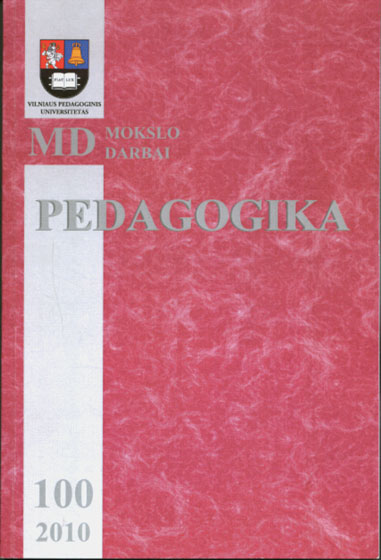Atvirojo mokymosi idėjos įgyvendinimo aukštojoje mokykloje patirtis
The experience of the realization of the idea of open learning at higher education institution
Author(s): Vaida Jakubauskaitė, Giedra Marija LinkaitytėSubject(s): Education
Published by: Vytauto Didžiojo Universitetas
Keywords: renewal-openness principle; open learning; traditional teaching.
Summary/Abstract: The article deals with the experience as concerns the realization of the idea of open learning at the institution of higher education. The authors of the article aim at drawing a parallel between M. Lukšienė’s philosophical and modern theoretical open learning insights as the basis for the analysis of the experience of open learning at the institution of higher education, and, for this purpose, refer to M. Lukšienė’s (2000) view that openness contributes to the creation of an open person who consequently contributes to the creation of open culture, M. F. Paulsen’s (2003) open learning theory, and M.Coomey and J. Stephenson’s (2003), R. K arjalainen and E. N iemi’s (2000) model of the shift of learning paradigms. The article presents the scenarios of the realization of university study programmes and the data of the research on the student learning experience. The obtained data revealed that the experience of university student open learning is different. Therefore, the teachers are to pay particular attention to the individualisation of the learning process, and open the learning by employing the dimensions of contents and Access. The results of the research supported the theoretical insights that open learning is the means for the realization of renewal-openness principle in practice with the main emphasis on the student by providing him / her with the possibilities to develop the skills of independent learning, communication and cooperation, and with the freedom of choice where, when and how to study. Traditional university study process is being opened on the basis of six dimensions: contents, time, space, learning pace, medium and access. The nature of openness should be evaluated on the basis of the criteria revealing all the six dimensions. Didactically the study process can be renewed by employment of three scenarios: traditional, distant, and open. The employment of the traditional learning scenario in the process of study organisation could be intended for teaching specific subjects; the distant learning scenario for independent studies and performance of teacher assignments or employment of the specific medium; the open learning scenario for self-directed studies. Practically, the teachers might profit from the authors’ insight that the shift from traditional teaching to open learning can cause confusion and conflict. In pursuance of avoiding this, the initial stage of the learning process planning should include the evaluation of the experience of students who start their studies. The evaluation of the skills of learning could allow choosing study scenarios to ensure consistent shift from one study scenario to another.
Journal: Pedagogika
- Issue Year: 2010
- Issue No: 100
- Page Range: 107-114
- Page Count: 8
- Language: Lithuanian

